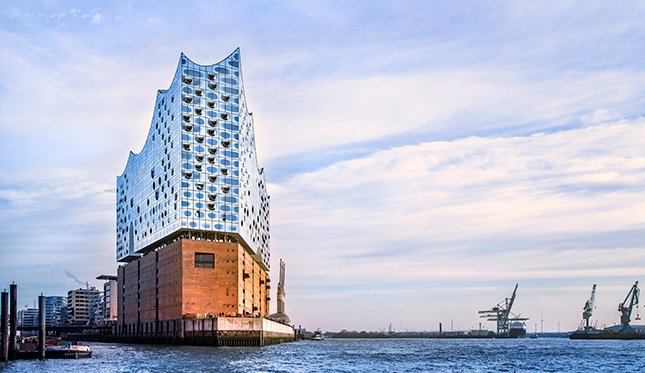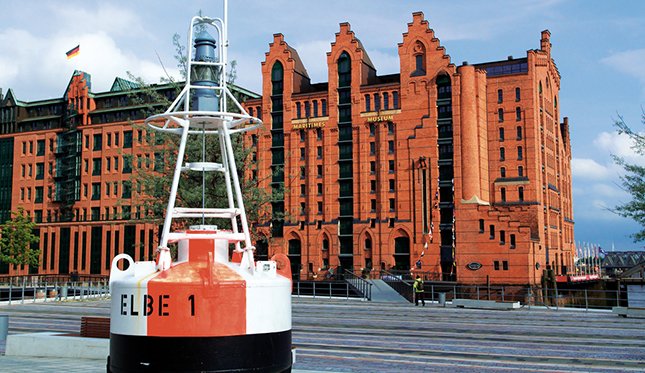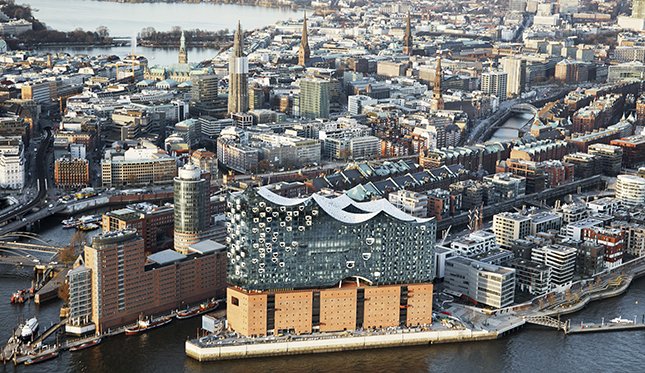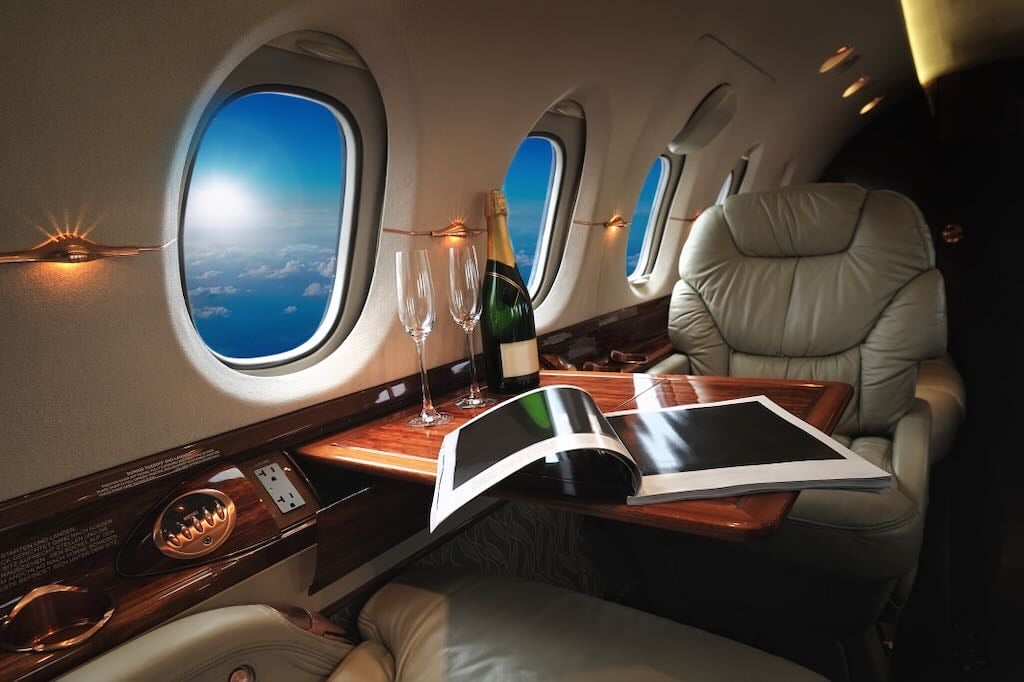Over the last year, travel must-see lists have increasingly featured one not-so-usual suspect: Hamburg, Germany, a thriving northern port city at the junction of the North Sea and the Elbe River. A departure from compatriots like edgy-cool Berlin and Bavarian charmer Munich, Germany’s second largest city feels more like Amsterdam, with its network of waterways and canals. Declared one of the 10 most livable cities in the world in The Economist’s 2017 Global Liveability Ranking, Hamburg delights tourists and river cruise day-trippers with attractions like its historic old town, museums and acclaimed dining—but the reason for its current high profile is more musical in nature.
A New Cultural Icon

Music has long played a key part in Hamburg’s story, from its first public opera houses in the late 1600s to the days when The Beatles honed their sound in the still-lively Reeperbahn nightclub district. The Elbphilharmonie concert hall, however, takes things to another level. Opened in early 2017, the Herzog & de Meuron–designed complex—which cost more than $900 million—sits along the Elbe river in a glass structure that evokes a hoisted sail or cresting wave. Perched atop a converted 1960s brick warehouse, the structure rises 26 stories.

In addition to restaurants, luxury residences, a Westin hotel and public viewing platforms, the complex is home to three high-tech music venues designed by master acoustician Yasuhisa Toyota: a small educational studio; a 550-seat space for chamber music and other intimate performances; and the Great Concert Hall with 2,100 seats surrounding the stage in a terraced “vineyard style” arrangement. The latter’s 10,000 sound plates—each individually shaped and positioned—make it one of the most acoustically advanced music halls in the world.
Given its acoustic cred, it’s no surprise that the Elbphilharmonie is attracting culturally minded visitors and helping to elevate Hamburg’s tourism landscape. Performers, too, are clamoring for bookings, and the schedule to date has featured symphony orchestras from London to Tokyo, as well as renowned soloists like pianist Sir Andras Schiff. The “house band,” the NDR Elbphilharmonie Orchestra, is now helmed by Alan Gilbert, who left his eight-year run as music director of the New York Philharmonic at Lincoln Center to take on this new role.
Where to Stay
The downside of the Elbphilharmonie’s high profile is that tickets sell out far in advance. However, two luxury hotels—both members of The Leading Hotels of the World network—offer VIP connections to help guests score the hottest tickets in town.
The luxe, historic, 18th-century Louis C. Jacob hotel enjoys a unique perch on the Elbe, in a leafy, upscale residential neighborhood outside the city center. Its quiet location has made it a favorite with CEOs and celebrities seeking to keep a low profile. Still intimate at just 85 rooms and suites (many of the latter are in the original manor house and feature magnificent river views), the hotel offers world-class dining at its two-Michelin-starred Jacob’s Restaurant, as well as more casual fare at Weinwirtschaft Kleines Jacob wine bar and garden, and the Lime Tree Terrace café. This property offers exclusive Elbphilharmonie experiences, including concert tickets, a pre-show dinner at Carls Brasserie (across from the venue), two nights in a double room and water transfers to and from the concert hall aboard the hotel’s elegant, wood-paneled private boat—with wine and cheese served on the return trip.

Hamburg‘s most-anticipated new hotel in decades, The Fontenay has generated almost as much buzz as the city’s new concert hall. Slated to launch in March, the $124 million sculptural property on the banks of Lake Alster integrates natural light and highlights the natural surroundings. All 131 rooms offer panoramic views, as do the top-level Lakeside fine dining restaurant, rooftop La Mer spa and massive infinity pool, which seems to flow directly into the lake. The hotel is a passion project owned by German billionaire developer Klaus-Michael Kühne—who was also one of the major sponsors of the Elbphilharmonie. Thanks to that connection, the hotel offers guest packages that include two nights’ accommodations with breakfast, premier seating to a performance, limo transfers, pre-show drinks at the Steinway Spirio Lounge near the concert hall and post-performance champagne in the Fontenay Bar.
Where to Eat
As a major trade port, Hamburg’s traditional cuisine is rich in both local fish and global ingredients and spices—distinguishing its cuisine from traditional German fare and creating a dynamic culinary scene that includes 10 Michelin-starred restaurants. Among the top spots to dine is three-Michelin-starred The Table, which hosts a maximum of 20 nightly guests, all seated at a long, curved wooden table around the open kitchen. Two-Michelin-starred Haerlin, also offers a chef’s table experience for up to eight guests, who are seated among the kitchen workstations so they can interact with chefs as they craft dishes like langoustines with sea urchin hollandaise, and veal sweetbread with onion tapioca and yuzu. (Seating in a full dining room is also available.) Another standout is the brasserie Die Bank, a favorite with the city’s influencers for its stylish location inside a former bank.
Sights to See

The Elbphilharmonie is part of the new HafenCity neighborhood, a development project that—when completed in 2025—will feature 6,000 residences, up to 45,000 workspaces, retail and dining hubs and public greenspaces. Completed structures so far include the futuristic Spiegel Publishing House and Unilever House. All this modernism contrasts the nearby Speicherstadt neighborhood, which houses the world’s largest complexes of warehouses that were built in a neo-gothic brick style between 1883 and the late 1920s. In 2015, the area—along with the Kontorhausviertel area of Old Town and the 1920s brick expressionism Chilehaus building—became a designated UNESCO World Heritage Site. You can explore on foot or via a canal boat to take in the red-hued historic structures. Key stops include the International Maritime Museum Hamburg, with thousands of model shops and, and the Automuseum Prototyp, home to rare prototypes of vintage vehicles.
For an artistic view of the city, explore Hamburg’s museum mile, lined with galleries and bookended by the newly renovated Kunsthalle museum—one of Europe’s largest museums with works by artists such as Paul Klee, Max Ernst and Pablo Picasso—and the Deichtorhallen, where contemporary art and photography exhibits are displayed in two former 19th-century market halls.










